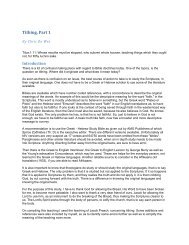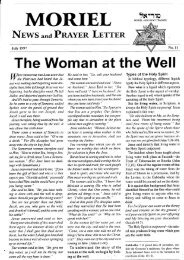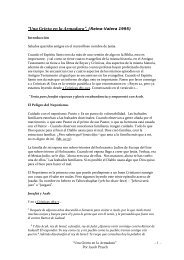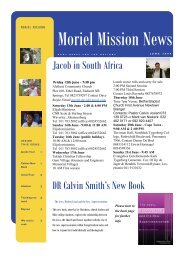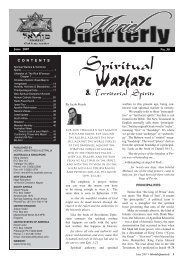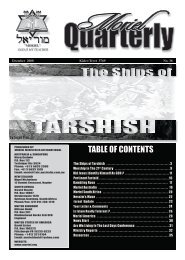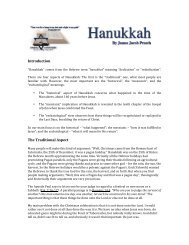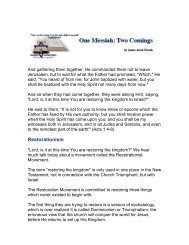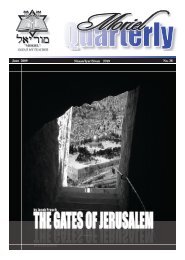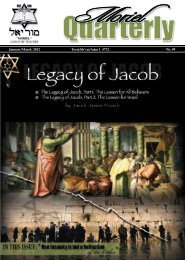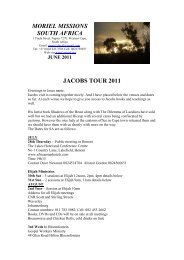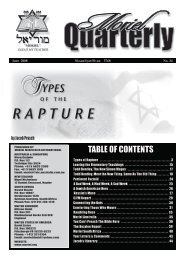April/June 20 No. 46 Nisan/Iyar//Sivan 577 - Moriel Ministries
April/June 20 No. 46 Nisan/Iyar//Sivan 577 - Moriel Ministries
April/June 20 No. 46 Nisan/Iyar//Sivan 577 - Moriel Ministries
You also want an ePaper? Increase the reach of your titles
YUMPU automatically turns print PDFs into web optimized ePapers that Google loves.
someone falls away from the Lord they have<br />
no peace in the Lord, they have no peace in<br />
their prayer life, they have no peace in anything.<br />
They keep resisting and resisting and<br />
resisting. People like that ultimately will<br />
not be saved. They will go so far there is no<br />
coming back. That can happen. They can actually<br />
reach that point.<br />
It is not easy, but there are people who<br />
have become so backslidden that they know<br />
the truth but they will not allow their wives to<br />
bring their children up in the Church. There<br />
are people who have husbands or wives who<br />
are so backslidden that they actually lead<br />
their own children away from the truth even<br />
though they themselves know the truth. This<br />
is a terrible kind of sin. There is some basis<br />
for associating this with blaspheming the<br />
Holy Spirit.<br />
They Saw the Light<br />
“For in the case of those who have once<br />
been enlightened”–“phoristhentas” is the<br />
Greek word. The idea is that they have “seen<br />
the light” or “come to the light.” It is not some<br />
abstract thing; they know exactly what it is.<br />
“Adonaton gan tous hapax phoristhentas<br />
genomentous te tes doreas tes epouranion<br />
kai metoxis genethentas pneumatos hagion.”<br />
(Heb. 6:4)<br />
“Once being enlightened and tasting the<br />
gift (“doreas”) and the heavenlies…”<br />
<strong>No</strong>t really a heavenly experience but “the<br />
heavenlies”…<br />
“…and sharers–partakers, more sharers<br />
they are becoming.”<br />
It is not that they “became,” but it is something<br />
ongoing (continuous present active). To<br />
become like that was as a result of “the Spirit.”<br />
There is no way that these people, who had<br />
actually been experiencing the Holy Spirit<br />
and in contact with their heavenly destination,<br />
were not believers. It is about believers,<br />
about people who have actually been saved.<br />
They came to the light–“phoristhentas.” “I<br />
saw the light.” (Ac. 22:9) “The true Light<br />
that was coming into the world that enlightens<br />
every man” (Jn. 1:9). They came to Jesus.<br />
They Tasted<br />
As a result of coming to Jesus something<br />
else happened: they “tasted” of it. The Greek<br />
is “gensomenous theon”–“they tasted the<br />
goodness.” What this text is doing is basically<br />
drawing on Psalm 34:8.<br />
O taste and see that the LORD is good;<br />
How blessed is the man who takes refuge in<br />
Him! (Ps. 34:8)<br />
These are people who have actually tasted it.<br />
As we continue reading this text in Hebrews<br />
6, for the one who tastes the Lord<br />
we have the Greek term “theon rema”–they<br />
tasted the “word.” But it is not the “logos,”<br />
it is the “rema.”<br />
There are two basic terms for the “word”<br />
of God in the New Testament in Greek:<br />
“rema” and “logos.” They are virtually synonymous.<br />
We cannot make the kind of distinction<br />
which some people do to the degree<br />
they do. Some say the “logos” is the printed<br />
word and “rema” is some kind of personal<br />
revelation from the Spirit. That is not true.<br />
What we can say is that the “logos” is objective.<br />
The Bible is the Word of God, and<br />
Jesus is Jesus, and it is Him in print. But the<br />
“rema” is what it becomes in experiential reality<br />
when it becomes truth in our life. Jesus<br />
is Jesus; He is the “Logos.” Only when the<br />
Logos comes to us in a personal way does<br />
the Bible really come alive, and that is the<br />
term that is used here. “Logos tos Theo” is<br />
the term used in Hebrews 4:12 that the author<br />
of Hebrews is building up to in Hebrews<br />
6. “For the Word of God is living and active<br />
and sharper than any two-edged sword”<br />
(Heb. 4:12). The word here is not “logos,” it<br />
is this personal encounter.<br />
In other words, there can be an academic<br />
theologian, a scholar who knows Greek and<br />
Hebrew perfectly but he is not born-again.<br />
He will have the “logos” in some way, but the<br />
“logos” will not have become a personal experience<br />
in his life; there will be no “rema,”<br />
no real revelation. It will be purely intellectual.<br />
The Bible in the hand of a man like that<br />
is useless. It is always somebody with God’s<br />
Spirit inside them who is “partaken” of the<br />
Holy Spirit. That is what the author of Hebrews<br />
is saying here. If someone is partaken<br />
of the Holy Spirit, the subjective truth–the<br />
“logos” –now becomes the “rema.”<br />
They Were Partakers<br />
These are people who have really come<br />
to some kind of personal experience and<br />
faith in Jesus: “partakers”–“metochous genethentas.”<br />
In Luke 5:7 this word is usually<br />
translated in English Bibles as “comrades.”<br />
In other words, they are people who became<br />
our comrades; they were one of us. They<br />
were not people who were never one of us,<br />
they were one of us. They were saved and<br />
they partook of “the heavenly gift”–“tes<br />
doreas tes epouranion.”<br />
This occurs in only one place in the Bible<br />
in this particular phrase, not using the word<br />
“charism”–“grace,” but “doreas.” We can<br />
say that God’s grace is in some way for everybody;<br />
He is gracious to everyone, even<br />
unsaved people. But this is not the word<br />
“charism”; it is not that kind of “grace.” It<br />
is “doreas,” the gift of salvation. It is His<br />
great, untold saving gift of the knowledge of<br />
the truth. It is more than the general type of<br />
grace that God gives to all people.<br />
The reason I point this out is that Calvinists,<br />
arguing from Calvin’s Institutes, will try<br />
to say that this means they did not come all<br />
of the way but only part of the way, but the<br />
text simply does not support that. Calvinists<br />
do what a lot of people do: they begin with<br />
a presupposition and then they have to begin<br />
doing monkey tricks with the text to fit<br />
that presupposition. But that is not what this<br />
text in its context in any way supports. These<br />
were people who knew the Lord.<br />
Feature Article – Continued<br />
They Fall Away<br />
Then it says in verse 6 that they commit<br />
apostasy–they go away. That word for “apostasy,”<br />
or if they had been falling away, is not<br />
“apostasia.” “Apostasia” is something different.<br />
This is another word, a Greek conditional<br />
expressed in the participle, “parapesontas.”<br />
It goes against the following argument.<br />
There is an argument that these people<br />
were Jews who believed and the writer of<br />
Hebrews was saying to them there was no<br />
way they could go back to Judaism, that it<br />
was impossible since there is no longer a<br />
sacrifice outside of where they were (as explained<br />
in Hebrews 10), and it means that<br />
they needed to stay where they were. When<br />
we read it in that context it has nothing whatsoever<br />
to do with saying that someone cannot<br />
fall away, but that is an argument some<br />
people try to impose.<br />
If the word was “apostasia,” that would<br />
be one thing, but the word is not “apostasia,”<br />
it is “parapesontas.” “Parapesontas”<br />
goes directly against this; it means something<br />
very different. It means “falling away<br />
from a standard. “Apostasia” comes from<br />
an entirely different Greek word altogether.<br />
The Greek root of “apostasia” means “to depart.”<br />
Someone is here and now they have<br />
left. This word for “falling away” describes<br />
someone who has not stopped believing it,<br />
but has stopped living it.<br />
Their argument is that this was written to<br />
Jewish believers and he was telling Jewish<br />
believers in the 1 st century that they cannot<br />
fall away because it is hopeless to go<br />
back to Judaism (the Temple is about to be<br />
destroyed, etc.) and they are to stay where<br />
they are. They argue that this was written before<br />
the Temple was destroyed so therefore<br />
it just applies to these believing Jews and<br />
that the destruction of the Temple prevents<br />
them from going back, and that this is not<br />
talking about believers losing their salvation.<br />
If that were the case, the word would<br />
be “apostasia”–“depart,” but it is not that<br />
word. This means “not living up to the same<br />
standard.” It describes someone who used<br />
to live a Christian life but has now departed<br />
from their belief; they are just not living it<br />
anymore. That fits the context exactly. Hebrews<br />
6 opens with, “Therefore leaving the<br />
elementary principles.”<br />
When we find people who after 10 years,<br />
<strong>20</strong> years, or 50 years still eat “baby food,”<br />
that is not normal or healthy. When we see<br />
people who become stagnant in their Christian<br />
life and never grow in grace, never grow<br />
in their knowledge and understanding of the<br />
Word, never grow by having their character<br />
changed by the image of God into the image<br />
and likeness of Jesus–they are really backsliders.<br />
When I was a kid there was a Bob<br />
Dylan song and one of the lines was, “He<br />
who is not busy being born is busy dying.”<br />
It is something like that. If we are not going<br />
ahead we are going backward.<br />
<strong>June</strong> <strong>20</strong>11 • <strong>Moriel</strong> Quarterly 11




